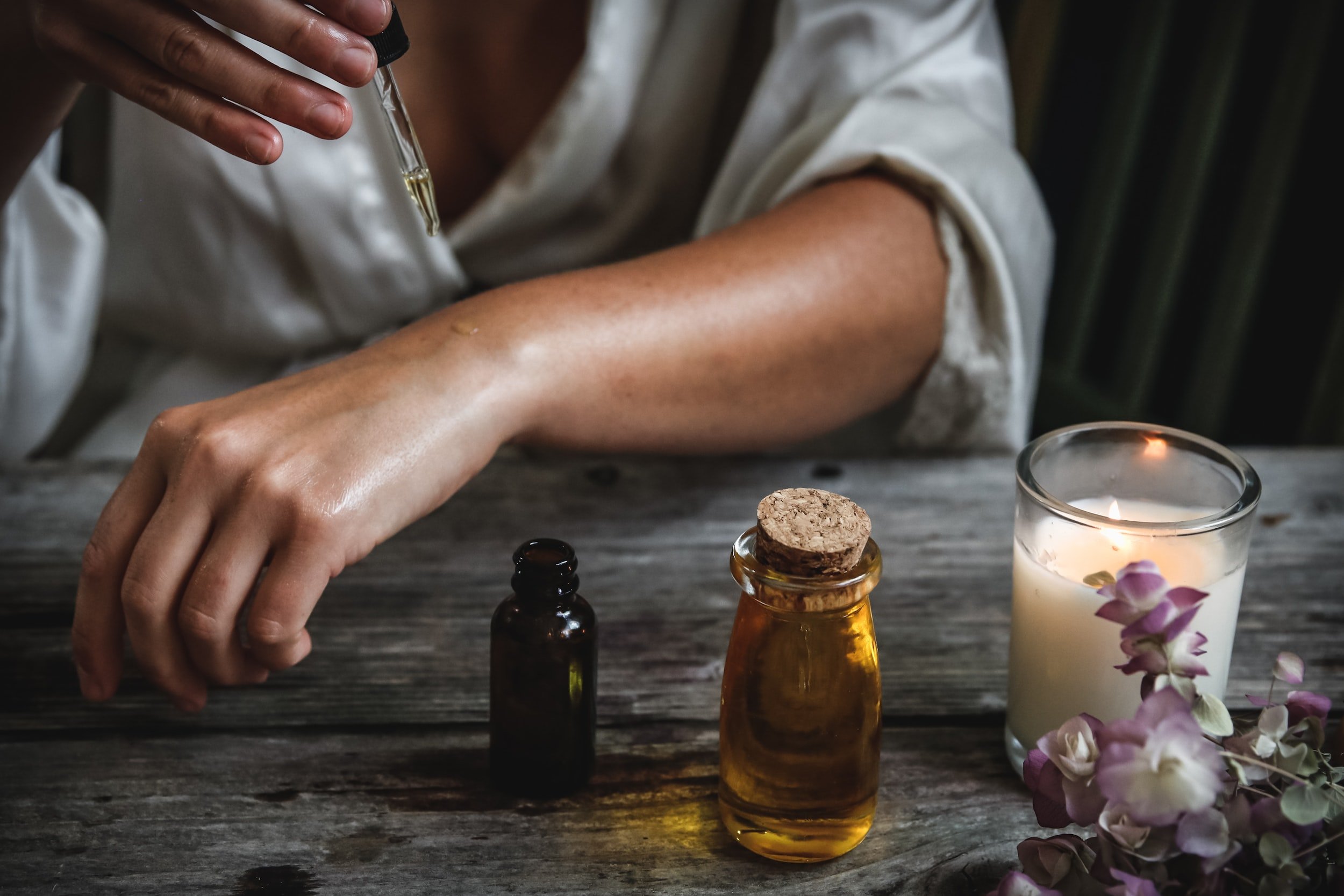Come to Your Senses
The sensory organs are the gateway to the nervous system. They connect our outer and inner worlds by sending information about our interaction with our environment to our brain, which then perceives and interprets that information. When the sensory channels are clear, we can perceive things clearly, which helps us to make choices that are nourishing and balancing.
One of the three main causes of disease according to the classical Ayurveda texts is mis-use of the senses. In our modern lives, this is most typically caused by overusing our senses and taking in more information and stimulation than our nervous system can metabolize and digest. Think about how you feel after you spend a day in a noisy, crowded room with lots of sensory overload versus spending a quiet, peaceful day in nature.
One of the greatest gifts I’ve received by starting an Ayurveda practice is developing a daily routine. In Ayurveda, this is called a dinacharya practice, and it is meant to help provide structure to the day and boost agni (digestive fire) by clearing out waste products from our sensory channels, and nourishing the nervous system. In essence, dinacharya practice helps us to begin the day with clarity and stability.
Whether we formalize it as a practice or not, most of us already have some kind of daily routine. We brush our teeth in the morning, make our bed, and grab a cup of coffee or tea. These small things add up, and most of us would feel a difference if we skipped a step.
Adding sense care to your routine can make a big difference in your health and wellness, and attaching these recommendations to something you already do each day can make it easier to build new habits.
Keep reading to learn more about daily sense-care practices for your ears, skin, mouth, eyes, and nose that can support your nervous system and improve your health and wellness.
The Ears
The ears are connected to the space element, which is why excessive or loud noises and sounds can be aggravating, especially for people with a lot of space in their constitution (vata dosha = space + air/wind). Some common signs of vata imbalance are anxiousness, difficulty concentrating, poor sleep (e.g. waking up at 2 or 3 am and not falling back asleep), constipation, dry skin, and difficulty hearing.
Just as loud, disturbing, negative, or excessive sounds can be stressful to the nervous system and aggravate vata, peaceful sounds and silence can be used to calm the nervous system, and therefore balance vata. Examples include silent meditation, sound healing, listening to peaceful music, chanting, bhramari pranayama, and being outside in nature listening to peaceful sounds such as birds chirping, a babbling brook, or the sound of the ocean. Getting quiet can help you to hear your own thoughts, which will help you to make choices guided by your intuition and what you need to feel balanced.
We can also cleanse and nourish the ears by massaging the ears and external ear canal with ear oil. Any empty space in the body can accumulate vata, including the ears, so an ear massage with oil can be very grounding and effective at balancing vata. It can also clean the ears and soften any waxy buildup, which can improve hearing if the difficulty with hearing is associated with obstruction. My favorite tool to use when I’m traveling to help me sleep at night is an ear and foot massage before bed. It works like a charm!
The Skin
The skin is the largest organ in the body. It serves to protect our muscles, bones, blood vessels, nerves, and organs, and it is an organ of digestion and elimination.
The Ayurvedic practice of abhyanga (warm oil massage) is one of my favorite practices for calming the nervous system and nourishing the skin. When I had a nerve injury that wasn’t healing, abhyanga made a huge difference. I also used to have excessively dry skin until I started practicing abhyanga regularly. Sesame oil is a good oil to use in the colder months because it has a warming effect. I’ve also been told that it has the same pH of the skin, so it is excellent for cleansing and hydrating the skin. Any other neutral oil (preferably organic) can be substituted. Coconut oil in the summer can be nice because it has a cooling effect. Adding oil to the skin is grounding, which can be supportive if you are in a period of anxiousness or stress. Oil massage also provides healing touch, which can help you feel more connected and comforted.
In the spring, adding garshana, or dry-brushing, before abhyanga can slough off dead skin cells and stimulate lymph movement to clear out stagnation and dullness and get the water element flowing smoothly.
The Eyes
The eyes process so much information every day, especially for those of us who spend a lot of time on screens. The eyes are connected to the fire element, which allows for vision. This also explains why our eyes burn when we overuse them.
It is important to give our eyes a rest. If you spend a lot of time on a screen, giving your eyes a break by looking out a window or closing your eyes for a minute every 20 minutes can support your eyes, and give your nervous system a break.
Because the eyes are connected to the fire element, eye care that incorporates qualities that are opposite to those of fire (e.g. cooling, soothing, moistening) can be soothing. One way to do this is to spritz rosewater in your eyes. Make your own with organic roses, or buy a rose hydrosol or rosewater that is distilled from organic roses. Just make sure you aren’t using rose essential oil mixed in water, which isn’t safe for the eyes.
The Mouth
When we sleep, the liver acts like the janitor and does detoxification and cleaning. In the morning, we should get in the habit of taking out the trash and removing the waste processed the night before. Have you ever noticed that your tongue has a coating on it in the morning? The tongue reflects the state of our digestive system, and a thick coating on the tongue that doesn’t come off when you clean your tongue indicates the accumulation of unmetabolized waste (ama).
One way to improve digestion, and to ensure a healthy oral microbiome is to remove the gunk that has built up on the tongue each morning. Before you drink or eat anything, use a metal tongue scraper to gently remove the build-up from your tongue. Then brush your teeth and swish your mouth with oil (called oil pulling). I really like the Daily Swish from Banyan Botanicals for oil pulling. It has a nice texture and a hint of mint for fresh breath. You can also use sesame, coconut, or other neutral oil. Cleaning the mouth before you consume any foods or drinks makes sure that you don’t push the waste products back into the digestive system. It also cleanses the palate, which improves the sense of taste, and therefore digestion as digestion begins in the mouth.
The Nose
The nose plays an important role in breathing and supplying energy to every cell in your body. It warms, humidifies, and filters the air we breathe, which makes it easier to digest. It is important to breathe through the nose so you are breathing in cleaner air to support the lungs and immune system.
One defense against allergies and pathogens is to clean the nasal passages with neti and nasya. Neti is the practice of pouring saline water through one nostril and out the other. It removes blockages and impurities and opens the pathways for breathing. This practice is best done during seasonal transitions, and times when the air is not dry. In the winter, neti can be too drying for the nasal passages. If you have a deviated septum, you should also skip the neti practice.
Nasya is the practice of oiling the nose. You can buy an herbal nasya oil that has herbs that clear the nasal passages and improve clarity and focus. Add one drop to each nostril and take a big sniff. You can also use your finger to massage the oil inside and around the nostrils.
Other practices to support the nose include smelling pleasant smells like flowers or baked apples. Smell is associated with memory - Just think of the nostalgia that you feel when you smell a particular smell. Smell also alerts us to danger, and odor reflects the amount of prana something contains. Think about how your brain reacts when you smell fire, or the difference between smelling fresh flowers versus decaying flowers.
You can also support the nose by taking a brisk walk outside or practicing pranayama. Slowing down the breath, particularly the exhale, is calming to the nervous system, and also balances vata. Nadi Shodhana clears the energy channels and improves the flow of prana through each nostril.
Dr. Claudia Welch wrote, “Eastern philosophy teaches us that we have awareness and we have choices about where to direct our attention. When we don’t consciously choose where it will go, it scatters out of our sensory organs into our environment.” Sense care improves clarity and focus, which helps us to be more accurate in assessing our needs. When the pranic channels are open, it is easier to make healthy choices that will keep us balanced and feeling our best.
Starting a sense care practice may be the thing you need to start building health habits by making self-care part of your daily routine. It can balance the nervous system, improve the flow of prana, and therefore improve metabolism. Give it a try and let me know how you feel!
And if I can support you in building a personalized daily practice to support your wellness goals and address any issues or injuries, please let me know. I’m here to support you so that you can shift from surviving to thriving!
* Don’t forget that you can receive a discount on Banyan Botanicals products using this link with the coupon code RACHEL15.





